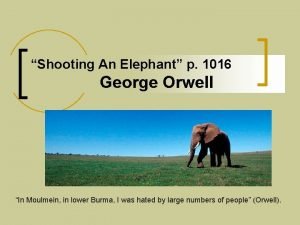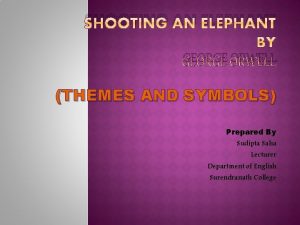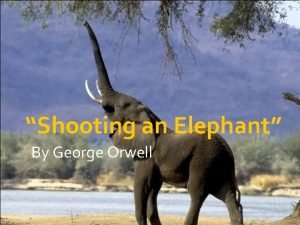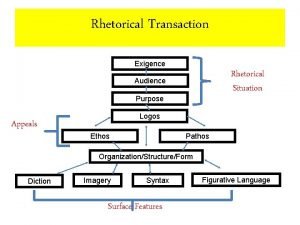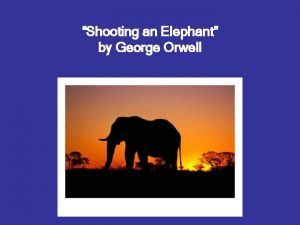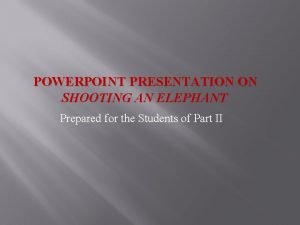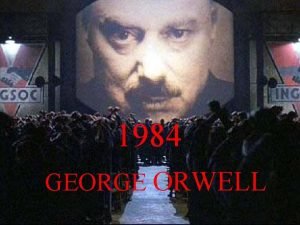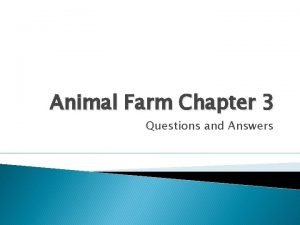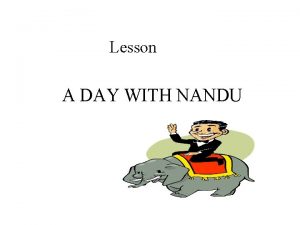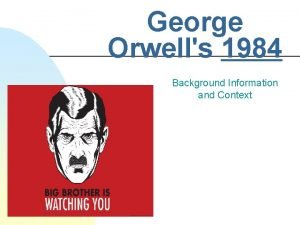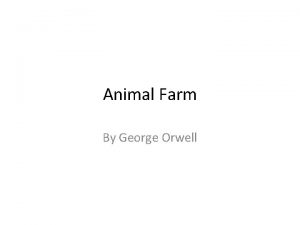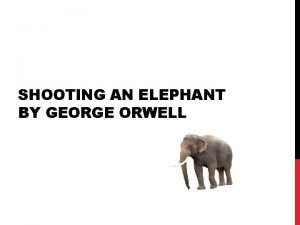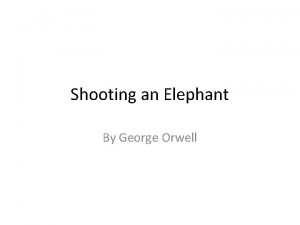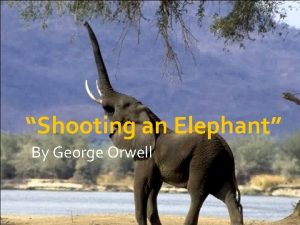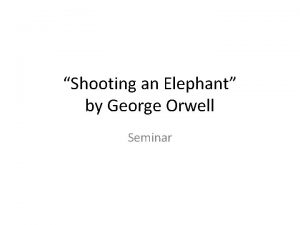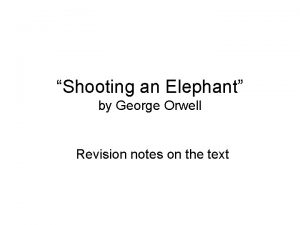SHOOTING AN ELEPHANT GEORGE ORWELL THEMES AND SYMBOLS

SHOOTING AN ELEPHANT GEORGE ORWELL (THEMES AND SYMBOLS) Prepared By Sudipta Saha Lecturer Department of English Surendranath College

THEMES

COLONIALISM Orwell uses his experience of shooting an elephant as a metaphor for his experience with the institution of colonialism. He writes that the encounter with the elephant gave him insight into “the real motives for which despotic governments act. ” Killing the elephant as it peacefully eats grass is indisputably an act of barbarism—one that symbolizes the barbarity of colonialism as a whole. The elephant’s rebelliousness does not justify Orwell’s choice to kill it. Rather, its rampage is a result of a life spent in captivity—Orwell explains that “tame elephants always are [chained up] when their attack of “must” is due. ” Similarly, the sometimes-violent disrespect that British like Orwell receive from locals is a justified consequence of the restraints the colonial regime imposes on its subjects. Moreover, just as Orwell knows he should not harm the elephant, he knows that the locals do not deserve to be oppressed and subjugated. Nevertheless, he ends up killing the elephant and dreams of harming insolent Burmese, simply because he fears being laughed at by the Burmese if he acts any other way. By showing how the conventions of colonialism force him to behave barbarically for no reason beyond the conventions themselves, Orwell illustrates that “when the white man turns tyrant it is his own freedom that he destroys. ”

POWER “Shooting an Elephant” is filled with examples of warped power dynamics. Colonialism nearly always entails a small minority of outsiders wielding a disproportionate amount of influence over a larger group of local peoples. This imbalance of power in colonialism seems counterintuitive, and Orwell literalizes the imbalance by showing his ability to kill the elephant singlehandedly. But even this distribution of power is not clear-cut: Orwell and the British colonists do not in fact have absolute power over their colonial subjects. As the story continues, it becomes clear that the British’s status as colonists has rendered them powerless: Orwell is irked by subtle insubordination from the Burmese, and, moreover, feels obligated to “spend his life in trying to impress the ‘natives’" out of his own pride and because it is necessary to maintain the power (or façade of power) of the colonizing British. Thus, Orwell depicts his colonial experience as a series of paradoxical relationships, all revolving around power.

PRINCIPLES � � Orwell’s service in the British Empire places his reasoned principles and his basic intuitions in constant conflict. He recognizes that the empire is tyrannical and abusive, yet he is unable to overcome his visceral contempt for the local villagers who mistreat him. The decisions Orwell makes when confronted with the rogue elephant encapsulate these tensions between his different principles. Orwell could have followed his more humane, ethical impulses and chosen to spare the elephant. However, in the same way that his resentment of the villagers compromises his principled objection to the British Raj, Orwell ends up compromising his humane impulses and killing the elephant because he fears humiliation. His motivation to do so is nothing more than his visceral (and racist) conviction that it would be improper for him to back down in front of the Burmese. At the end of the story, Orwell describes the debate surrounding his choice to kill the elephant. The arguments his colleagues offer for and against the act are largely legal, but this legal justification is clearly a secondary concern for Orwell. It is only a fortunate coincidence that his actions were legally justified. Ethical principles did not factor heavily in his decision-making process: his real motivation was simply to “avoid looking a fool. ”

PERFORMANCE When Orwell stands before the crowd, he likens himself to a performer, rather than a peacekeeper or powerful official. He repeatedly uses metaphorical language to develop this connection. The thousands of gathered Burmese regard him as they would regard “a conjurer about to perform a trick; ” he describes how, as he loaded the rifle, “the crowd grew very still, and a deep, low, happy sigh, as of people who see theatre curtain go up at last, breathed from innumerable throats. ” Orwell is constrained by the spectacle of his colonialist stature. His language demonstrates that colonialism is not fueled by genuine needs, duties, or obligations—but rather by the British need to perform the role of colonizer in order to maintain their colonialist power. Like colonialism, shooting the elephant is an act of senseless destruction; it is utterly unnecessary and goes against everyone’s real interests. Still, the colonial system grinds on, simply because each participant feels obliged to fulfill his assigned role within the larger performance. The colonist, Orwell asserts, “wears a mask, and his face grows to fit it. ” In other words, the colonizer is a performer who subsequently adopts, or is overcome by, his dramatic role, which becomes his real identity whether he likes it or not.

SYMBOLS

THE THREE SHOTS The three shots symbolize three big events that paved the way for the end of imperialism: � 1) The Great Depression � 2) WWI � 3) Rise of authoritarian regimes (e. g. Soviet Union and Nazi Party)

THE ELEPHANT The elephant is the central symbol of the story. Orwell uses it to represent the effect of colonialism on both the colonizer and the colonized. The elephant, like a colonized populace, has its liberty restricted, and it becomes violently rebellious only as a response to being shackled. Orwell, a colonizer, feels a similar ambivalence towards the elephant as he does towards the Burmese locals. While he recognizes that both are harmless and peaceful and have suffered wrongs at the hands of others, he still perpetuates barbarous treatment of both, simply in order to uphold an irrational standard of imperial behavior. He kills the elephant simply because he fears that he would be humiliated if he failed to do so. In much the same way, colonial savagery perpetuates itself simply because colonists fear that they would look weak or ridiculous if they acted less inhumanely. Orwell further humanizes the elephant by referring to it throughout the story with the pronoun “he, ” rather than “it. ”

THE DEAD COOLIE The dead coolie represents the maltreated Burmese, trampled by the British Empire. � Described as "lying on his belly with arms crucified“. � There is a clear allusion to the crucifixion of Jesus. � The coolie is sacrificed in order to justify Orwell's actions. � This symbolizes how the people killed in colonies were "sacrificed" in order to justify rebellions and wars against the Imperialist countries.

CHAINING OF THE ELEPHANT The Burmese chaining the elephant (British Empire) symbolizes how the British must live up to the expectation of its colonies. “When the white man turns tyrant it is his own freedom that he destroys. He becomes a sort of hollow, posing dummy, the conventionalized figure of a sahib. ” (Para. 7)

THE ELEPHANT GUN The elephant gun represents the power of the British Empire. At first, the gun is used to control the colonists, but when Orwell uses it to kill the elephant in order to appease the colonists, the power of the British Empire is turned against itself.

THE END
- Slides: 13
